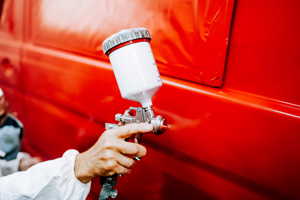 Jaguar. Ford. Ferrari. Three iconic automakers with storied racing pedigrees that have made some of the fastest and most beautiful cars in the world, each draped in a coat of paint of their own signature color: British Racing Green, Ford’s Grabber Blue, and Ferrari’s Rosso Corsa.
Jaguar. Ford. Ferrari. Three iconic automakers with storied racing pedigrees that have made some of the fastest and most beautiful cars in the world, each draped in a coat of paint of their own signature color: British Racing Green, Ford’s Grabber Blue, and Ferrari’s Rosso Corsa.
Beyond providing a bit of personality and character, a car’s paint also serves a practical purpose: protecting the body, frame, and other components from the elements, preventing rust and corrosion from destroying the raw material underneath. The earliest paint jobs were done by craftsmen such as furniture makers and carriage builders who applied varnish primers and oil-based enamel paints by hand. These finishes were inky, with low opacity and coverage, requiring multiple coats and lengthy drying times. And even with all that work involved, the paint would soon become brittle and start chipping away. Continue reading “Controlling Temperature in Paint Booth Heat Exchange Systems”

